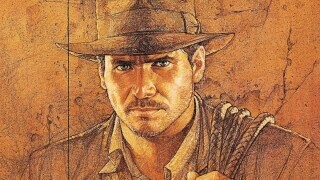How Sequels Ruined the Point of 'Raiders of the Lost Ark'

This weekend marks 40 years since Indiana Jones first bullwhipped his way onto movie screens with Raiders of the Lost Ark, to the delight of moviegoers and presumably the disdain of snake-lovers. Looking back at the original film from here in the future year of 2021 (in which a fifth Indy adventure is currently being filmed), it's certainly difficult to untangle the legacy of Raiders from its many sequels. In many ways, an Indiana Jones franchise was inevitable since the character was borne out of Steven Spielberg's frustration with the James Bond producers who refused to hire him. But while Indiana Jones may have started out as a Bond substitute, unlike 007, the mere existence of further Indiana Jones sequels undercuts the central message of the original film.
A recent article on Collider dismantled the old "Indiana Jones doesn't matter" theory -- and they're right, considering this a "plot hole" is to miss the point of the entire movie, which is that it's Indy's inaction that ultimately leads to his victory. Pretty much every choice Indy makes just leads to screw-up after screw-up. As we've mentioned before, the climactic moment when Indiana Jones closes his eyes as the ark is opened, when he abandons his ego and accepts the possibility of the otherworldly, is what makes him a hero -- not that he can capably gun down street toughs in order to save the victim of his past sex crimes.
Don't Miss
Indy's journey is from a guy who doesn't give a crap about pillaging other cultures' temples and stealing their sacred idols to someone who is humbled into acknowledging that he should respect others' beliefs even if he doesn't share them. The moral of Raiders of the Lost Ark is not to do the stuff Indiana Jones is famous for doing. The movie tells us this visually as well; while the movie begins with Indy ascending a mountain towards adventure, it ends with him descending a D.C. staircase with Marion, suggesting that he is moving away from his days of being a filthy treasure hunter.

Lucasfilm

Lucasfilm
But of course, Raiders of the Lost Ark was a huge hit, so naturally, they made more. At first, this issue was somewhat side-stepped by the fact that The Temple of Doom is a prequel. But while that may have solved the issue of addressing his apparent character growth, it introduced a whole new problem; Indiana Jones witnessing a bunch of crazy ancient magic years before the events of Raiders just nullifies his arc from the opposite end of the story. After all, why would he scoff at the idea of "superstitious hocus pocus" when he witnessed this shit first-hand:
This issue was compounded by the prequel TV series in which "Young Indiana Jones" encountered magical knick-knacks on an alarmingly regular basis. And when Raiders of the Lost Ark was finally sequel-ized with The Last Crusade, Indiana Jones had seemingly undergone a factory reset, back to the same guy we saw in the opening moments of Raiders. Not only is there no mention of Marion, but he also doesn't seem to have learned from the events of the first movie at all; he's back in the same outfit (which he apparently cribbed from some random crook) and is once again plundering for profit.
This is fine for someone like James Bond, whose character growth, by design, never goes beyond perhaps trying a new cocktail or contracting an exotic STI. But in that first adventure, Spielberg and his collaborators imbued Indiana Jones with something James Bond never had: a capacity for change. Regardless of how good or bad they might be, the sequels fundamentally drain the original of much of what made it emotionally fulfilling to watch the first time. Even more frustrating is the fact that the most recent sequel, the much-reviled Kingdom of the Crystal Skull, ended with … Indiana Jones settling down with Marion.
It took them almost 30 years to circuitously get Indiana Jones back to the very same conclusive story beat he had in the very first movie, which everyone proceeded to ignore.
You (yes, you) should follow JM on Twitter! And check out the podcast Rewatchability.
Top Image: Lucasfilm